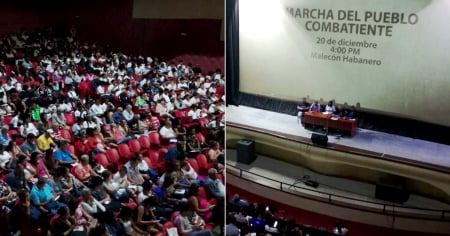The Cuban government announced the creation of a new Code for Children, based on the values and principles of dictator Fidel Castro, as well as other controversial figures like Ernesto "Che" Guevara, and those distorted by propaganda and official history, such as José Martí.
During the presentation before the National Assembly of People's Power (ANPP), the ruler Miguel Díaz-Canel emphasized that this code aims to protect and prepare children, adolescents, and young people for the country's future, guiding them "in favor of the Revolution."
"We are discussing 'the present and future of the country,' about a code that must protect, which not only embraces but also prepares for life, preparing our children, adolescents, and young people so that they can 'develop all their abilities in favor of the Revolution,'" reported Granma, quoting the remarks of the First Secretary of the Communist Party of Cuba.
The main goal is to ensure the comprehensive development of new generations by focusing on "values, ethics, and civic behavior," Díaz-Canel affirmed.
In this regard, he emphasized the richness of revolutionary pedagogy, stating: "We have an arsenal in pedagogy, revolutionary thought, and rights, in Fidel, the Che, and Martí," which should guide the development of the document.
He also proposed a broad public consultation to discuss the content of the code, involving educators, teachers, children, adolescents, and families, similar to what was done with the Family Code, “but without the need for a referendum,” he said.
The proposal also addressed violence against minors, stating that "in Cuba, there should not be a single person from these age groups who feels at a disadvantage or is unsure in their educational institutions."
However, these claims contrast with frequent reports from human rights organizations and independent media regarding instances of institutional violence and state repression, often involving threats to the parents or guardians of minors related to custody issues.
indoctrination and state control: A context of repression and manipulation of minors in Cuba
Education in Cuba has historically been influenced by a strong ideological component. From a young age, children are exposed to practices aimed at instilling the values of the Revolution.
In April 2024, it was reported that children from Matanzas participated in pioneer parades in celebration of International Workers' Day, where they were taught loyalty to the historical leaders and to the "continuity" of the prevailing political system.
In December 2024, it was reported that in a Christian church in Havana, a captain of the Revolutionary Armed Forces (FAR) gave talks to children about military life, highlighting a dangerous complicity between the church and the Cuban regime to promote the official ideology.
In November 2024, Díaz-Canel urged children to embrace Fidel Castro's ideology, reinforcing indoctrination from the highest levels of power. These actions reflect a systematic strategy to shape the awareness of new generations in line with the interests of the State.
In addition, in February 2024, a video was released showing a teacher who is a member of the Communist Party visiting a fifth-grade classroom to speak to the children about the "honor" of being a party member, emphasizing the need to "be like Fidel." This type of activity in the school environment reinforces the presence of official ideology in education.
The recent proposal for the Child Code, inspired by revolutionary figures, fits into this tradition of indoctrination.
Although it is presented as an initiative to protect and prepare new generations, various sectors of Cuban society and international observers express concern about the politicization of childhood for political purposes.
The lack of a plural debate and the imposition of a single ideological perspective could restrict the development of critical and independent thinking among Cuban children and youth. While the Cuban government promotes the creation of a new Children's Code based on revolutionary values, criticisms persist regarding the use of education as a tool for political indoctrination.
The Code as a Tool of Repression
Given this documented history of threats and state repression, there are concerns about the possibility that the new Code on Children may be used as a legal tool for social control and to repress political opponents and activists in Cuba.
The precedent of using the children of dissidents as a means of pressure raises questions about the true intentions behind this legislation. The inclusion of terms like "educating in revolutionary values" and "defending the Fatherland" within the legal framework could enable punitive measures disguised under the rhetoric of protecting minors.
In March 2024, State Security allegedly threatened the wife of a political prisoner to stop reporting abuses against her incarcerated husband, warning her that she could lose custody of her children if she continued with her allegations.
In December 2023, activist Idelisa Diasniurka Salcedo was threatened with the loss of custody of her children for political reasons, in an act of retaliation for her public activism and denunciations against the regime.
In February 2023, the ex-husband of an imprisoned opposition member was subjected to similar threats, being warned that his children could be separated from him if he continued to publicly denounce the situation of his ex-partner.
The cases mentioned above illustrate a recurring pattern of threats related to the custody of opposition members' children. While the official discourse advocates for the establishment of an observation system to monitor the implementation of the Code, the history of state repression suggests that it could become yet another mechanism of control.
These circumstances raise skepticism about the effective implementation of the proposed Childhood Code, particularly concerning the rights and safety of minors in Cuba. They also raise alarms about the potential use of this legislation to bolster state repression under a legal facade.
Filed under:
